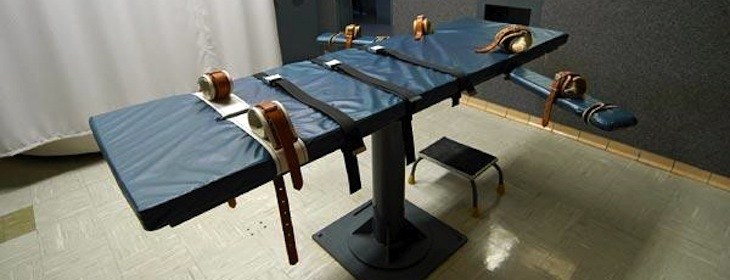Federal suit filed to block eight executions in Arkansas set for April
by March 27, 2017 7:46 pm 743 views

Eight Arkansas death-row inmates scheduled to be put to death over a 10-day period in April filed a federal lawsuit Monday (March 27) asking the court for an expedited hearing to halt the state’s “regressive, antiquated” execution schedule.
The motion asks the federal court for a preliminary injunction to prevent the state from executing the prisoners on the appointed dates between April 17 and April 27 “so that the court may adequately consider their claims on the merits.”
“For the reasons stated in the accompanying brief, plaintiffs are likely to succeed on the merits and will suffer the irreparable harm of death if preliminary relief is not granted,” the court filing states. “The balance of the equities favors plaintiffs in this matter. And it is in the public interest for the Court to put a halt to the State’s regressive, antiquated execution schedule.”
Gov. Asa Hutchinson has set four execution dates in April for eight Arkansas inmates on death row whose appeals have been exhausted and whose cases the U.S. Supreme Court declined to review in late February. Hutchinson scheduled the following eight inmates – with date of execution – to be put to death, all for capital murder.
• April 17: Don Davis, Bruce Ward
• April 20: Stacey Johnson, Ledelle Lee
• April 24: Marcel Williams, Jack Jones
• April 27: Jason McGehee, Kenneth Williams
COURT ALLOWS USE OF LETHAL DRUGS
The door to the executions was opened Feb. 21, when the U.S. Supreme Court denied a petition for a writ of certiorari regarding the state’s method of execution. The Arkansas Supreme Court earlier had ruled in the state’s favor in a case regarding Act 1096 of 2015 allowing makers of execution drugs to remain secret.
Along with that ruling, the court had issued an injunction pending the decision by the U.S. Supreme Court. Thirty-four men are now on Arkansas’ death row. The last inmate executed was Eric Nance in 2005, for the rape and murder of Julie Heath of Malvern.
Two weeks ago, state Correction officials obtained a new supply of potassium chloride and can proceed with eight scheduled executions in April, assuming they happen then. The state’s supply of potassium chloride, one of three drugs in a cocktail used in executions, had expired in January. One of the two other drugs, midazolam expires April 30, 2017, while the supply of vercuronium bromide expires March 31, 2018.
Midazolam is used to put the inmate to sleep, while vercuronium bromide causes paralysis and potassium chloride stops the heart.
‘UNCONSTITUTIONAL SUFFERING’
In the 32-page memorandum in support of the death row inmate’s motion for an expedited injunction to block the executions, the plaintiffs’ attorneys argue that ADC Director Kelly “probably knows and definitely should know” that lethal injection will almost certainly cause “unconstitutional suffering.”
“Despite acknowledged problems with midazolam, Hutchinson has set eight executions to occur on a schedule of unprecedented speed,” the filing states. “Hutchinson’s admitted reason for this haste is that the State’s supply of midazolam – the very drug that has caused botched executions in the past – expires on April 30. Rather than attempting to obtain more of the drug, Hutchinson has chosen to have Plaintiffs executed en masse.”
The plaintiffs’ attorneys also argue that ADC does not have appropriate protocols or training materials in place in case one or more of the executions goes awry.
“The rushed schedule appreciably increases the risk of harm to plaintiffs, falls far outside the bounds of modern penological practice, and disrespects the (inmates’) fundamental dignity – defects that all run against the Eighth Amendment’s protection. On top of all that, Kelley has created policies that prevent plaintiffs from accessing the courts and from having the assistance of counsel during the execution if and when something goes wrong,” the filing states.
John Williams, federal defender for the Arkansas death-row inmates, told Talk Business & Politics that the complaint was filed to slow the state’s efforts to send the prisoners to the death chamber, only 21 days from today’s date.
“We look forward to challenging the (governor’s) schedule for the executions,” Williams said.
Spokesmen for the Department of Corrections and governor’s office would not comment on the filing by the death-row inmates. However, Jessica Ray, spokeswoman for Attorney General Leslie Rutledge, called the prisoners’ lawsuit “another attempt to delay justice.” Ray said although AG Rutledge is reviewing the lawsuit, “she will continue to fully defend Arkansas’s method of execution, and she expects the executions to proceed as scheduled.”
